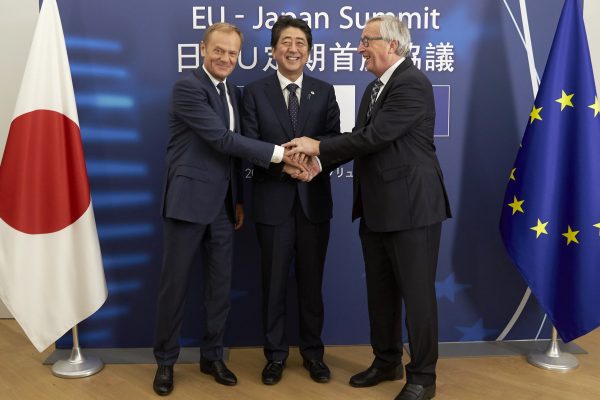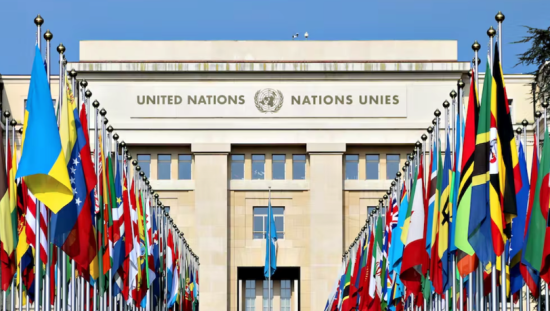The ongoing US–China trade war signals a tumultuous period to come. In an increasingly volatile world, the retaliatory tariffs imposed on the US come as a mere phase in what could be a devastating new Cold War. Besides the tariffs, the US and China are at a standstill on the trade deal and face further conflict over the 5G race.
The mounting hostility between the two superpowers cannot be ignored, as conflict could spill over to the rest of the world. The recent attack by Iran’s Islamic Revolutionary Guard Corps Navy on Norwegian- and Japanese-owned oil tankers—and the subsequent cozying of Iran to China and Russia—challenges the US-led world order. Japan can pursue a smart diplomatic strategy that would make the most of the current dilemma and cement its status as an international leader in the new Reiwa era (meaning beautiful harmony).
Japan should not feel that its close relationship with the US should hinder its chances at a friendly relationship with China. It can remain America’s “little brother” while working with China without necessarily aligning with China’s views. It would be a much more economic cooperation in which both sides benefit without significant concessions.
Progress has been made, as the ruling Liberal Democratic Party’s (LDP) Secretary General Toshihiro Nikai participated in the Belt and Road Forum held in April (the US opted against participating). The forum—an alternative to the G20 summit—pushed the One Belt, One Road initiative, a Chinese development plan based on infrastructure development and investments. The Secretary General commented that Sino–Japanese relations should be conducted without gauging US interests. This attitude suggests there has been a change in the mindset of the top brass in the LDP over their potential leverage in the US–Japan relationship.
Perhaps such confidence in downplaying their “little brother” status in the relationship with the US can be traced to Japan’s recent diplomatic successes with other nations. Japan has signed two enormous trade deals in the last year. The success in leading the third-largest free trade agreement (thirteen percent of global GDP) — the Comprehensive and Progressive Agreement for Trans-Pacific Partnership which the US left — was a major accomplishment for Prime Minister Shinzo Abe’s administration. This has boosted confidence in Japan’s leadership abilities abroad. Domestically, it proved that there was no need to always rely on the US for larger, multinational transactions. The Prime Minister’s strong diplomatic record can be used more often to navigate through tough times where previously agreed upon deals are being broken (Iran and the nuclear deal).
In stark contrast to the inconclusive US trade deals with Canada, Mexico, and China, the EU–Japan trade deal further cemented Japan’s pro-trade attitude. This deal led to the EU liberalizing 99 percent of tariff lines and 100 percent of imports; Japan liberalized close to the same percentage. Tariff-free trade is likely to bring the EU and Japan closer, indicating stronger independence from the US and leverage over the US in future trade negotiations.
In addition, the EU and Japan agreed on a Strategic Partnership beyond trade that promotes multilateralism and cooperation on important issues such as cyber security. This cooperative deal shows that while being a strong ally to the US, Japan can also promote a pro-trade agenda and cooperate with multiple nations as opposed to working bilaterally. This will lead to further international confidence in Japan, which boosts the nation’s portfolio abroad as a reliable partner in times of volatile diplomacy.
In June, the G20 summit in Osaka allowed the US and China to hold trade talks once again. After the summit, President Trump announced there would be no additional tariffs imposed on China, which prevented escalation of the conflict. The president also stated intentions to resume trade talks. Despite falling short of a conclusive deal, this was a short-term win for all parties. While both countries have suffered economic losses, the effects of the trade conflict have extended to others.
Since last year, Japan’s exports to China dropped 7.8 percent, and the deficit with their largest trading partner is at 391.7 billion yen (about $3.6 billion). Experts point to the tension between the US and China as the main cause for this drop, while also pointing out that exports have dropped for six consecutive months. As a permanent deal seems unlikely in the near future, the next logical step is to pursue the middle ground and cooperate with both sides.
Antagonizing the US is out of the question, but when it comes to China, Japan has had a rocky relationship that can be mostly traced back to the atrocities committed against the Chinese (like the Nanjing Massacre) during World War II. Although certain moves have been made to cooperate with China, there are still major roadblocks ahead. President Xi Jinping’s visit to North Korea and his pledging of support to Chairman Kim Jong Un should cause alarm in Tokyo, as a China-backed North Korea could cause security problems for Japan. With US–North Korea talks stalled, Chinese support of North Korea may prompt an ever more aggressive build-up of North Korea’s nuclear arsenal. This spells trouble for Japan, as was proven when North Korea launched a missile over the Japanese mainland in August 2017. President Xi’s continued support of North Korea should be considered when world leaders meet at the next G20 summit.
Japan and China also contest ownership of the Senkaku Islands in the South China Sea. China has continued to violate territorial waters off of the island in a strategic move to test Japan’s resolve. Since this is a strategic area where China wants to build its defense, Japan needs to maintain the current level of conflict while ironing out a plan to ensure peace in the region.
This is where Japan’s strong relationship with the US may come in handy. While US–China relations may not be as strong, Prime Minister Abe’s friendship with President Trump is great, evident from numerous golf outings and nominating the president for the Nobel Peace Prize. The Prime Minister should use this relationship wisely and assure China that there is no real “threat.” This process can be initiated by relocating the American bases in Okinawa and dissuading strategic territory grabs.
China’s aggressive violations come at a time when it feels threatened by American presence in the Pacific. Failed deterrence by neighboring nations like Japan and South Korea proves that China will not leave the region unless absolutely certain that their interests are protected. Thus, Japan can facilitate peace by using its strong relationship with the US and proposing a Japanese-led defense of the region. By having an Asia-led Asia defense strategy, the antagonistic nature of deterrence can be lifted. Perhaps in the future, when China is ready to negotiate, they may join in on the alliance to promote a harmonious Asia region without the US being heavily involved at every step in the process.
The US–China dispute is no longer exclusively about trade. It is an increasingly likely Cold War that involves expanding power through telecommunications and next-generation technology. While economic damage must be minimized, the implications of a full-scale conflict far outweigh the immediate damages. Japan should use its close relationship with the US to facilitate a working relationship with China.
However, cooperation cannot be perceived as a US-led initiative. Japan, as they have proven through successful multilateral trade deals, can and should lead the initiative to cease conflict and promote peace and prosperity. An almost ethereal scenario would be one in which Japan spearheads the US defense strategy in Asia, and somehow comes up with a multinational alliance that involves Asian countries working together harmoniously to promote prosperity for all. That, it seems, is in everyone’s self-interest, and would certainly be the goal to strive for in an increasingly volatile world. In a very Japanese sense, this would be the perfect way to begin the Reiwa era.
It’s a shame that Japan hasn’t fully leveraged its impressive record of promoting peace. In a time when confidence in the US is dwindling due to President Trump’s bilateral, antagonistic diplomacy, Japan can promote healthy, mutually beneficial diplomacy. When such a strategy succeeds, Japan could strike a working relationship with China to promote Asia’s success. If the two great Asian powers can cooperate, it should better relations between the two world superpowers. In a sense, the ball is in Japan’s court. Whether they make use of it or pass on the opportunity is entirely up to the will and determination of the administration.



